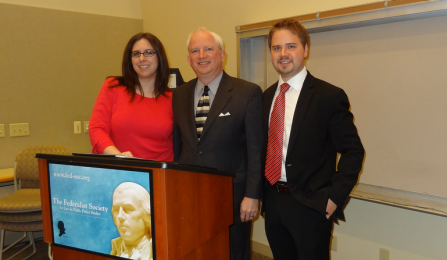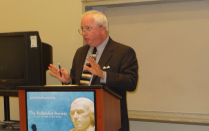November - 2013
Who gets in? Immigration forum explores tough questions from different perspectives

Kathryn Hartnett '15, Dr. John C. Eastman, and Artur Jagielski ’15.
Perhaps the most famous poem about coming to America – Emma Lazarus’ “The New Colossus,” etched on the pedestal of the Statue of Liberty – was the springboard for a challenging Oct. 18 discussion at the Law School about what kind of welcome our nation should extend to potential immigrants.
With its lines “Give me your tired, your poor, your huddled masses yearning to breathe free,” the poem seems to present an America entirely open to those who might wish to pursue happiness here. But speaker John C. Eastman, an authority in constitutional law and legal history, noted that the poem was added a decade after the statue was dedicated in 1886. Dr. Eastman, a former clerk for U.S. Supreme Court Justice Clarence Thomas, is a professor—and former dean—at Chapman University School of Law, in Calif.
In reality, he said, the message of the statue – which commemorates the Declaration of Independence on its centennial – is focused on the vision of government with the consent of the governed. “The torch,” he said, “is not a beacon for everybody to come here, but rather more of a ‘shining city on a hill’ model.”
Eastman said the nation could choose a completely open-door policy on immigration; could disallow all immigration; or could, as it has done, choose a middle course, setting a “modest level” of immigration to be allowed.
He detailed a series of recent court cases and administrative actions – such as the proposed federal DREAM Act, which would provide conditional permanent residency to some undocumented immigrants – as examples of how the United States has tried to define that middle course.
Eastman noted that the demand for immigration to the United States, both lawful and unlawful, is great. One reason, he said, is the assumption of “birthright citizenship,” in which any child born on U.S. soil is automatically granted U.S. citizenship.
That assumption comes from the 14th Amendment to the Constitution, which specifies that “All persons born or naturalized in the United States, and subject to the jurisdiction thereof,” are U.S. citizens. The debate, he said, arises from the interpretation of the jurisdiction clause: Did the authors mean territorial jurisdiction, the temporary authority of the state over a visitor, or complete jurisdiction, in which the person at issue owes allegiance to the nation?
“It goes back to this notion of the Declaration of Independence,” Eastman said. “When we separated from Great Britain, we claimed an authority to become our own people and to be treated equally in the laws of nations. We then consented with each other to form a certain kind of government that we thought would give greatest effect to securing the inalienable rights that we have as human beings.
“Every nation treats their own people differently from other nations’ people; that’s the basic core of this doctrine of consent. The current interpretation of citizenship law rejects the notion of bilateral consent. People can unilaterally claim to become members of a different body politic even if that body politic has through its laws specifically said otherwise. That’s not consent as a basis of this mutual compact that forms the body politic; it is something dramatically different.”
In her response, SUNY Buffalo Law Professor Teresa A. Miller, who teaches immigration law, acknowledged, “I don’t think anybody questions for a minute that we have a broken immigration system.” But, she said, U.S. immigration enforcement has become “inextricably entangled” with the criminal justice system, and “there are severe consequences when families are broken up” through enforcement of immigration laws. “Deportation means breaking up families,” Miller said, “and it doesn’t fit with what we think the U.S. stands for.
“We really need to think very hard about an enforcement-based strategy that has incredible costs. As we’ve seen in the war on drugs, the costs to the U.S. economy, the costs to families, the costs to communities have just gotten too great. I want to challenge you to think about the costs of maintaining the broken system we have today.”
And the Statue of Liberty poem, she said, “stands for something. In the United States, that poem strikes a chord. It’s important to pay attention to what it means to America, that sense of people being embraced by the U.S. It strikes a chord in America, culturally, that we have people from Vietnam, people from China, people from Malaysia, people from Germany, people from Brazil, people from all over the world who come here. It’s important to our country’s sense of identity.”
The forum was sponsored by the Law School’s chapter of the Federalist Society and by the Latin American Law Students Association.
